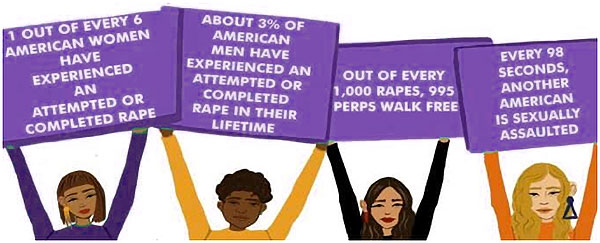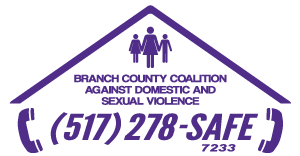Sexual Violence Is:
Any sexual act or act targeting a person’s sexuality, gender identity or gender expression, whether the act is physical or psychological in nature, that is committed, threatened or attempted against a person without the person’s consent, and includes sexual assault, Sexual Harassment, stalking, indecent exposure, voyeurism and sexual exploitation.
Examples of Sexual Violence:
- Sexual Assault
- Child Sexual Abuse
- Intimate Partner Sexual Violence
- Incest
- Drug Facilitated Sexual Assault
- Sexual Harassment
- Stalking
- Using Technology to Hurt Others
- Sexual Abuse by Medical Professionals
- Sexual Exploitation by Helping Professionals
- Multiple Person Sexual Assault
- Elder Abuse
- Sexual Abuse of People with Disabilities
- Prison Rape
- Military Sexual Trauma
Root Causes of Sexual Violence:
- Racism- believing a person is less worthy or unimportant because of their race or ethnic background.
- Sexism- believing a person is only capable of doing certain things because of their sex/gender.
- Socio-economic Class- your level of importance in society is based on how much income you have.
- Oppression- having your life cruelly controlled by someone else, unjust treatment by person or group.
- Witness to or previous victim of sexual abuse
YOU ARE NOT ALONE! You may feel alone and isolated, but there are people that can help you.
Are you safe? After the experience of sexual trauma, you may feel shock, disbelief, or the sense of being overwhelmed. If you do not feel safe, consider reaching out to someone you trust.
Once you feel more physically safe, it’s important to connect with a person you trust for support. After shock, sexual trauma survivors often experience depression, anxiety and dissociation. It is crucial to confide in someone you fully trust. It is important to find a person who will not pry into the details of the experience, but who is there to say, ‘I am sorry this happened to you. Are you feeling safe? How can I help you?’
If you prefer to express your experience and emotions anonymously, you can also call to call a crisis hotline such as the Branch County Coalition Against Domestic And Sexual Violence at 517-278-SAFE (7233) or National Sexual Assault Hotline 800-656-HOPE (4673) Hotline operators are trained to offer support, hear your story, connect you with resources for treatment and provide you with information on how to report the crime.
Consider your medical options
Many survivors may be reluctant to pursue medical attention in the immediate wake of a sexual assault. It is ultimately up to you to decide what to do in accordance with your own physical, psychological and emotional needs.
Choosing to go to the hospital or a medical rape center after an assault can be beneficial for a number of reasons. Most critically, health care practitioners can treat bodily injury and help ensure your sexual and physical health. Additionally, they can provide you with a rape kit—a sexual assault forensic exam that can be used to collect DNA, blood samples and other evidence. If you are not ready to file a police report immediately, some centers can store the evidence for later use.
Making the decision to obtain a rape kit can be scary. But once you feel confident making the decision, it is best to go through with the process as quickly as possible. In many places, the window for collecting bodily forensic evidence is just 72 hours. If possible, victims who choose to get an exam are encouraged not to shower, comb their hair, use the restroom or change their clothes before completing the rape kit.
If possible, take your trusted friend with you for support, or an advocate from the local Sexual Assault agency can accompany you.
Work through your experience
The desire to simply avoid addressing or processing the incident is common among survivors. Learn healthy coping habits—which may be as simple as journaling, walking or meditating. These tips can help survivors effectively process their trauma.
Never doubt you own intuition. Even though logically you may know you were assaulted, paralyzing anxiety can make you wonder, ‘was it my fault? Was it actually consensual?’” This sense of guilt can worsen the negative psychological effects of trauma. As such, counseling may provide an effective forum for mediating, understanding and coping with your emotions.
Seek out a counselor who is specifically trained to address sexual trauma. Memory is dynamic and changing, and each time you remember an event, your brain forms new associations, thereby modifying the memory. As such, counseling can provide a safe space to remember your trauma, and over time, can decrease the negative psychological effects associated with the trauma. We offer free counseling at Branch County Coalition Against Domestic and Sexual Violence. We also offer support groups, where you can share time with other survivors. Remember, you are NOT ALONE.
Consider your legal options
While some survivors are adamant that they want to file a police report or prosecute the assailant, for many others, the decision is not so cut and dry; they may be reluctant to report the assault immediately and may be confused as to what they should do next.
The decision is completely up to you, as the survivor, to make the decision based om your own best interest.
Branch County Coalition Against Domestic and Sexual Violence not only has advocates on staff to assist you, but we also have a Legal Advocate on staff. The Legal Advocate can assist you with every step of the legal process. She is not an attorney and cannot offer legal advice, but she can accompany you and offer support throughout the entire process. The court process can be daunting and terrifying for the survivor, our Legal Advocate is there to make you feel more safe and secure during the process.
Our Legal Advocate can also help with a Personal Protection Order, (PPO) if one is needed or wanted.
Reconnect to yourself and your life. Caring for yourself.
Emotional self-care means different things to different people. The key to emotional self- care is being in tune with yourself. Think about a time when you felt balanced and grounded, and consider asking yourself the following questions:
- What fun or leisure activities did you enjoy? Were there events or outings that you looked forward to?
- Did you write down your thoughts in a journal or personal notebook?
- Were meditation or relaxation activities a part of your regular schedule?
- What inspirational words were you reading? Did you have a particular author or favorite website to go to for inspiration?
- Who did you spend time with? Was there someone, or a group of people, that you felt safe and supported around?
- Where did you spend your time? Was there a special place, maybe outdoors or at a friend’s house, where you felt comfortable and grounded?



